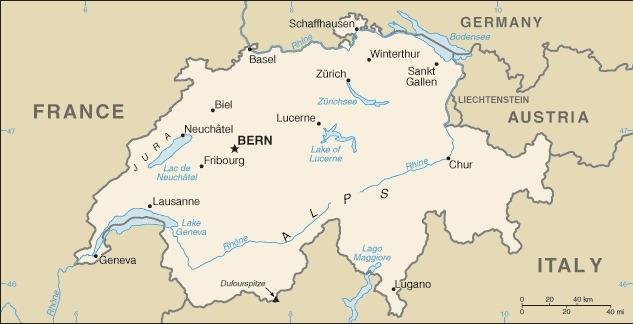Country Summary




Introduction
Background
The Swiss Confederation was founded in 1291 as a defensive alliance among three cantons. In succeeding years, other localities joined the original three. The Swiss Confederation secured its independence from the Holy Roman Empire in 1499. Switzerland's sovereignty and neutrality have long been honored by the major European powers, and the country was not involved in either of the two world wars.
Geography
Area
total: 41,277 sq km
land: 39,997 sq km
water: 1,280 sq km
Climate
temperate, but varies with altitude; cold, cloudy, rainy/snowy winters; cool to warm, cloudy, humid summers with occasional showers
Natural resources
hydropower potential, timber, salt
People and Society
Population
8,508,698 (2022 est.)
Ethnic groups
Swiss 69.2%, German 4.2%, Italian 3.2%, Portuguese 2.5%, French 2.1%, Kosovan 1.1%, Turkish 1%, other 16.7% (2020 est.)
Languages
German (or Swiss German) (official) 62.1%, French (official) 22.8%, Italian (official) 8%, English 5.7%, Portuguese 3.5%, Albanian 3.3%, Serbo-Croatian 2.3%, Spanish 2.3%, Romansh (official) 0.5%, other 7.9%; note - German, French, Italian, and Romansh are all national and official languages; shares sum to more than 100% because respondents could indicate more than one main language (2019 est.)
Religions
Roman Catholic 34.4%, Protestant 22.5%, other Christian 5.7%, Muslim 5.4%, other 1.5%, none 29.4%, unspecified 1.1% (2020 est.)
Population growth rate
0.65% (2022 est.)
Government
Government type
federal republic (formally a confederation)
Capital
name: Bern
Executive branch
chief of state: President of the Swiss Confederation Ignazio CASSIS (since 1 January 2022); Vice President Alain BERSET (since 1 January 2022); note - the Federal Council, comprised of 7 federal councillors, constitutes the federal government of Switzerland; council members rotate the 1-year term of federal president
head of government: President of the Swiss Confederation Ignazio CASSIS (since 1 January 2022); Vice President Alain BERSET (since 1 January 2022)
Legislative branch
description: bicameral Federal Assembly or Bundesversammlung (in German), Assemblée Fédérale (in French), Assemblea Federale (in Italian) consists of:
Council of States or Ständerat (in German), Conseil des États (in French), Consiglio degli Stati (in Italian) (46 seats; members in two-seat constituencies representing cantons and single-seat constituencies representing half cantons directly elected by simple majority vote except Jura and Neuchatel cantons, which use list proportional representation vote; member term governed by cantonal law)
National Council or Nationalrat (in German), Conseil National (in French), Consiglio Nazionale (in Italian) (200 seats; 194 members in cantons directly elected by proportional representation vote and 6 in half cantons directly elected by simple majority vote; members serve 4-year terms)
Economy
Economic overview
high-income, non-EU European economy; renowned banking and financial hub; extremely low unemployment; highly skilled but aging workforce; key pharmaceutical and precision manufacturing exporter; fairly high public debt
Real GDP (purchasing power parity)
$590.71 billion (2020 est.)
Real GDP per capita
$68,400 (2020 est.)
Agricultural products
milk, sugar beet, wheat, potatoes, pork, barley, apples, maize, beef, grapes
Industries
machinery, chemicals, watches, textiles, precision instruments, tourism, banking, insurance, pharmaceuticals
Exports
$470.91 billion (2020 est.)
Exports - partners
Germany 16%, United States 14%, United Kingdom 8%, China 7%, France 6%, India 6%, Italy 5% (2019)
Exports - commodities
gold, packaged medicines, medical cultures/vaccines, watches, jewelry (2019)
Imports
$401.91 billion (2020 est.)
Imports - partners
Germany 21%, Italy 8%, France 6%, United States 6%, United Kingdom 5%, United Arab Emirates 5% (2019)
Imports - commodities
gold, packaged medicines, jewelry, cars, medical cultures/vaccines (2019)
Exchange rates
Swiss francs (CHF) per US dollar -
Page last updated: Thursday, December 22, 2022